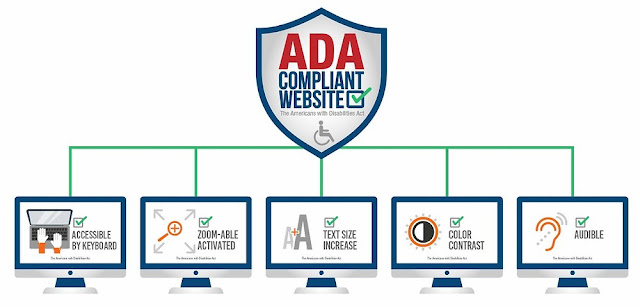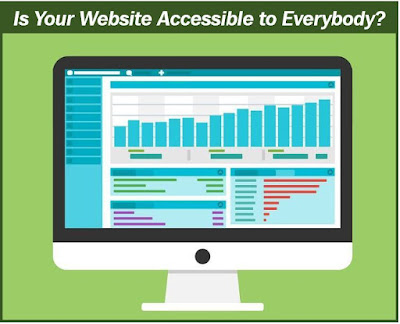Nearly 20% of people live with a disability. ADA compliance services from Digital Papercuts use advanced AI technology provided by EqualWeb to provide a great experience for all site visitors — regardless of disabilities or impairments. Contact us to make sure your site complies with ADA and 508 standards, and start improving user experience today!
What part does WCAG 2.1 play in ADA compliance?
For those unfamiliar with the ADA, it is a Law that requires companies to offer and maintain sites that people with disabilities can use and access. The most recent statistics from 2018, showed that the number of web accessibility lawsuits in the U.S. increased by 177% from the previous year to 2,258.
ADA compliance extends to all websites in the United States." In addition to ADA Website Compliance Services, Mr. Power also helps local businesses grow with online marketing and branding.
Is ADA compliance mandatory for my website?
If you have a website that isn't ADA accessible, may then be liable for a lawsuit. For example, it could be filed against your company if people with disabilities cannot access or use your site. One might argue that you didn't intend to discriminate or exclude people with disabilities from accessing your website; however, you may end up paying thousands of dollars in lawsuits if it is simply not accessible.
ADA Website Compliance Service
ADA Website Compliance Services helps users ensure their website is ADA compliant before facing a lawsuit and a long legal battle. Terry Power mentions in a recent statement: "We charge a flat fee of merely $899 to examine the website and build a code that can be attached to it which can bring it into compliance. In this way, the website does not need to be redone, which could be quite expensive. We complete this usually in four or five days."
Easy Compliance states that any business with a website should make it accessible for everyone, especially with 20% of the population having a disability, be it visual, auditory, or motor. And this should alert anyone with a website to ensure it is accessible and including every individual.
Mr. Power adds, "I can take a local business and make their website inclusive in less than a week. Their announcement of the compliance can result in significant customer, client, or patient growth." So, ADA Website Compliance Services is proud to launch its nationwide ADA compliance solutions, and website owners can avoid a lawsuit.
Consumer Scams:
Don’t fall for automated accessibility/compliance scams (cheaper prices but worthless widgets)
There are no automatic or instant solutions (e.g. toolbars, overlays, widgets, plugins, apps) for website accessibility — caveat emptor
Be careful of purchasing accessibility audits (sometimes priced as high as a few thousand dollars) that are free automated scan results in a fancy PDF
Digital marketing agencies are claiming ADA Compliance expertise to boost revenue but most know little about accessibility
Critical Legal Points:
Plaintiffs’ lawyers continue to file ADA and parallel state (California and New York) lawsuits as fast as they can in 2020
Fair Housing Act and other anti-discrimination laws are also being used to sue website owners and target specific industries (e.g. FHA for real estate)
Having less than 15 employees doesn’t save you from ADA Compliance
Well here we are.
You’re over there trying to figure this stuff out so you don’t get sued. And I’m over here writing at 4:40 am because I can’t sleep.
Okay, for the record I did watch Bill Burr on Netflix before this but that’s besides the point.
Anyway, let’s quickly make ADA Website Compliance easy on you so a wild pack of opportunistic lawyers doesn’t make a paper airplane demand letter and float it on over to your desk.
(Author’s note: I highly recommend you make it to the end of this article. It’s kinda long but the next 12 minutes could very well save you $10,000+.)
Ensuring that all individuals can access the psychologist's web presence is good for business and good for the people of the local community, making it easier for everyone to access psychological services
Evaluate your website for ADA compliance
The lack of websites and mobile apps that pass accessibility compliance standards was disappointing news for accessibility advocates.
When schools and businesses closed due to COVID-19, the public turned to the web for supplies, services, education, information, and access to their jobs.
What they discovered were websites and apps they could not use.
A determined, frustrated mother of two autistic children who continued their schoolwork at home described to me how her children struggled to understand their teachers’ assignments.
At school trained teachers assisted her children and their classmates.
At home, not only were the websites for school lessons confusing to use, but the teachers themselves wrestled with badly designed learning sites and found themselves playing the role of tech support.
Elsewhere around the world the public was suddenly placing orders with web apps or learning how to video chat with family members.
Employees were sent home to do their jobs.
Not only were employees unprepared for the transition to working from home, but the disabled or persons with impairments were left to fend for themselves.
Almost immediately it was glaringly clear that businesses and schools were not ready to meet the demand for accessible websites and software.
ADA accessibility lawsuits and compliant letters soared.
ADA Accessibility Complaints & Lawsuits
Sometimes the first indication that a website is not accessible is a complaint letter sent by a law firm on behalf of a plaintiff who could not use it.If you are new to website accessibility, the legal ramifications of not providing an accessible website are important to know.
The Americans with Disabilities Act (ADA), when it was first established as law 30 years ago, did not include the term “website” as a form of Public Accommodation for Title III. It applies to physical buildings.
Section 508, however, includes government websites and any business tied to the federal government through its services or product sales.
Universities are one example because they provide federal student loans. They are required by law to provide accessible websites.
Nowadays, as we follow more cases in the U.S., the definition of “public accommodation” is being interpreted by some state courts to include websites and apps.
Very often, a single Plaintiff’s attorney and sometimes the same disabled individual will file dozens or more lawsuits against many different companies alleging technical violations of Title III, and seek injunctive relief (e.g., for the company to make its website ADA accessible) and attorneys’ fees that are authorized by the statute. These lawsuits have targeted businesses across a number of industries, including retail stores, restaurants, health care providers, and e-commerce companies. This glut of litigation over alleged technical ADA website compliance violations has frustrated the courts,[1] and, thus far, neither Congress nor the Department of Justice (the “DoJ”), the primary federal government agency responsible for enforcing the ADA, have adequately clarified the scope of the ADA in terms of website accessibility compliance for private companies.
WCAG Principles
There are four underlying principles to the Guidelines:- Perceivable: you’ve probably heard of the philosophical question “if a tree falls in the forest does it make a sound if nobody hears it?” It’s the same concept as a website. If a person cannot perceive the auditory or visual information on a website, then is the website really there? It should take neither squinting nor third-party technology in order to perceive all content on your website.
- Operable: does your website require the use of a less-common piece of technology or hardware, such as a joystick or a microphone? Can someone use your website and input information, or even make a purchase, without the use of a keyboard or a mouse? Users with physical disabilities will have more difficulty with using your website if it requires using certain technology and if your website is not optimized to work with assistive technology.
- Understandable: Even if someone can perceive your website that doesn’t mean that they can understand it. If a person can perceive that there’s text on a page but it is so poorly written but it’s hard to understand commands or information, then the website is just as useless as if the content weren’t perceivable.
- Robust: Have you ever visited a website that popped up a warning you were not using the latest web browser and needed to upgrade before using it? This could be very frustrating especially for someone using an older platform, browser, device or operating system. Although website owners are not expected to create websites that are compatible with the oldest versions, they should not require the newest.
Areas of focus
Accessibility issues are categorized in four distinct groups under WCAG guidelines. Conveniently, they can be summed up with the acronym P.O.U.R.- Perceivable issues are those that affect a user’s ability to find and process information on a website (for example, providing audio descriptions for video content).
- Operable issues are those that impact a visitor’s ability to navigate and use a website (for example, ensuring that all site functions and navigation can be operated via keyboard-only commands).
- Understandable issues concern a user’s ability to discern and comprehend all information and navigation on a website (for example, composing error messages that include a clear explanation of the error and direction for correcting it).
- Robust issues involve a website’s ability to adapt and evolve to meet the changing needs of users with disabilities (for instance, testing compatibility with all leading screen readers and ensuring that those capabilities can be upgraded in the future).
The ADA & Web Accessibility
The crux of the problem is that when the ADA was enacted, Congress did not adequately anticipate the crucial role that the internet would have in peoples’ lives in the 21st Century, and instead focused on discrimination based on disability that occurred in person or through personal interactions. Title III provides the standards required for businesses’ physical locations to properly accommodate disabled individuals, but does not provide guidance for the internet, or web-based and mobile applications. Nor does Title III expressly limit its coverage to brick-and mortar locations or exclude online locations.
Create A Better Site – As a rule of thumb, websites that are universally accessible are better websites. If developers follow ADA website compliance steps it can help them design and develop higher caliber websites. A lot of the guidelines overlap with the best practices of web development and design.
Avoids Legal Issues – Having a website that is ADA compliant will help you stay ahead of any possible legal issues in the future. You won’t have to worry about discrimination claims from individuals with a disability. Having a site that is compliant shows you are able to work with many government agencies and non-profits that require their sites to be ADA compliant.
Improves Usability For Everyone – Making websites easier to navigate which helps users that are disabled and people without a disability. Everyone can benefit from a website that has better usability which improves your overall user experience.
Broadens Audiences – Being ADA compliant means your website is universally accessible which makes it easier for more people to use. This leads to more users, more traffic, and in the end more customers. Being accessible will not guarantee you an increase in your bottom line, but it gives you the opportunity to increase your audience and this could raise awareness for your business.
Normalizes Accessibility – The more websites that are designed to be ADA compliant helps to make accessibility the norm. When it’s normalized it can help more people trying to reach the required goal easier across the board.
Improves Your SEO – This is a no brainer. Having an accessible site improves your SEO rankings. We discussed above how Google gives websites that are accessible a higher priority in the SERPS. Not only that, but accessibility features will improve the chances for search bots to index your website. As with website design, a lot of the ADA standards fit into SEO best standards.
Generates Positive PR – You can stand apart from your competitors by having an ADA compliant website which helps boost your company’s reputation. It shows that your company is thoughtful and inclusive to everyone.
WCAG Website Compliance Standards
Those numbers come according to a study conducted by Seyfarth Shaw LLP, an internationally recognized law firm. That is an increase of 177% from the 814 filed in 2017.
This trend is going to continue, so it’s imperative that you take the steps necessary to make your website ADA compliant.
In filed cases, judges determined that complying with the Web Content Accessibility Guidelines (WCAG) is enough. This provides an acceptable level of accessibility to those that have disabilities limiting their ability to navigate and read websites.
We’ll address what you need to know about ADA compliance and give you action steps to reach an acceptable level of accessibility. That way, you can be in compliance and avoid a potential lawsuit.
How Do I Make My Website ADA Compliant?
Courts have come to different conclusions regarding whether Title III’s coverage is limited to physical spaces and whether a company’s website requires a nexus to a physical location to be subject to Title III’s protections. This uncertainty and lack of clarity regarding Title III’s scope is problematic for businesses that want to comply with Title III’s requirements, but do not necessarily want to foot the hefty bill for updating their websites consistent with the “gold standard” stated in the Web Content Accessibility Guidelines (“WCAG”) established by the World Wide Web Consortium (“W3C”) with the state of the law in flux.
While the courts and the DoJ have provided some guidance on these issues, Congress has not. The remainder of this post will analyze the current state of the law, recent efforts to lobby for clarification of the ADA and better guidance, and potential court interpretation and agency clarification of Title III that may occur in 2019.
ADA Compliance Audit Best Practices
The Internet has dramatically changed the way state and local governments do business. Today, government agencies routinely make much more information about their programs, activities, and services available to the public by posting it on their websites. As a result, many people can easily access this information seven days a week, 24 hours a day.
ADA Website Remediation
Many government services and activities are also provided on websites because the public is able to participate in them at any time of day and without the assistance of government personnel. Many government websites offer a low cost, quick, and convenient way of filing tax returns, paying bills, renewing licenses, signing up for programs, applying for permits or funding, submitting job applications, and performing a wide variety of other activities.
ADA Website Maintenance
The Americans with Disabilities Act (ADA) and, if the government entities receive federal funding, the Rehabilitation Act of 1973 generally require that state and local governments provide qualified individuals with disabilities equal access to their programs, services, or activities unless doing so would fundamentally alter the nature of their programs, services, or activities or would impose an undue burden.2 One way to help meet these requirements is to ensure that government websites have accessible features for people with disabilities, using the simple steps described in this document. An agency with an inaccessible website may also meet its legal obligations by providing an alternative accessible way for citizens to use the programs or services, such as a staffed telephone information line. These alternatives, however, are unlikely to provide an equal degree of access in terms of hours of operation and the range of options and programs available.
The Web Content Accessibility Guideline: De Facto Standard for Digital Accessibility
Due to the increase in ADA website accessibility lawsuits and negative media coverage about them, the U.S. House of Representatives, by a 225-195 vote, passed legislation in February 2018, the ADA Education and Reform Act of 2017, that would have amended the ADA to force prospective plaintiffs to first provide written notice of noncompliance to public accommodations – such as businesses operating public websites – before filing suit. The company would then have 60 days to come up with a plan to address the plaintiff’s concerns. However, that bill stalled in the Senate, where 43 Senators – enough to filibuster the bill – pledged in writing to block a vote on the Act. Therefore, it is unlikely to become law anytime soon, especially given the results of the midterm elections.
As you’ve probably figured out by now, the answer is no, because it’s not at all clear how or even if ADA rules will be applied to any particular website. Still, it’s generally a good idea to err on the side of caution. Many states have adopted their own accessibility laws, and the volume of accessibility-related lawsuits filed against websites has ballooned in recent years. Plaintiffs have been more successful in these suits than ever before. With no clearly defined regulations to follow, it is probably not worth it for most companies to gamble that a court will rule in their favor.
What Are the Requirements for Website Accessibility and ADA Compliance?
Web accessibility addresses the needs of every website visitor to achieve an optimal level of usability and ADA compliance. Many people browsing the web have a permanent disability (visual, mobility or neurological impairment), or a temporary impairment such as a broken arm, broken or lost eyeglasses, and so on. Many baby boomers have aging-related issues that make using the web more challenging, and they’re not alone–about 20% of the U.S. population has an identified disability.
So, without a clear set of accessibility regulations to comply with, how can you tell if your website is compliant? The best measure available is the aforementioned WCAG 2.0 Level AA guidelines. WCAG standards have been the guiding accessibility principle in the European Union and other countries since 1999, with the most recent update taking effect in Spring of 2018. While WCAG is a set of recommended actions rather than enforceable legislation, it forms the backbone of many online accessibility laws around the world and offers a strong model for any American organization striving to provide equal access for all users.
Levels of Compliance
WCAG guidelines break accessibility issues down into three levels. Level A issues are the most urgent and include problems that can severely limit a disabled visitor’s ability to navigate or use the website. Level AA issues tend to be more rooted in functionality, addressing areas where improvement is needed to give disabled users the full experience of a site. (Level AA is considered the target standard for most commercial websites.) Level AAA issues are the highest standard, fine-tuning and expanding on issues identified as Level A and AA. While it is an excellent goal, full Level AAA compliance is likely beyond the reach of most websites
























0 Comments
We welcome relevant and respectful comments. Spam comments will not be approved.